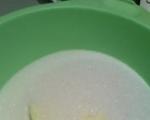The fair half of humanity should carry out water procedures for the genitals every day. In this case, you should wash them with warm water, directing it from front to back. This rule should also apply to the use of toilet paper. Why is this so important? The thing is that a woman can introduce various infections into the vagina, including E. coli, which causes inflammation of the genital organs.
Due to poor ecology, you have to follow a few more basic rules when carrying out water procedures:
To saturate the skin cells with oxygen and moisture, you need to use a washcloth;
- in order not to disturb the natural flora of the genital mucosa, you should not allow gel or soap to get into the vagina;
- to tone the skin and activate the body’s protective properties, it is necessary to use folk remedies such as sea salt, herbal infusions, etc.;
- after a shower, the body should be dried with a hard towel.
On the days when menstruation occurs, you should wash yourself three to four times a day without soap and preferably with boiled water, since at such a moment any infection can enter the genitals.
Don't forget to change your underwear every day.
A few more points about feminine hygiene
The modern girl strives to look attractive and does not care about her health. However, this can lead to dire consequences, especially in the cold season. Hypothermia is not your genitals' best friend, so try to dress as warmly as possible.
Deodorants are also an integral part of female body hygiene. And if you have increased sweating, then you simply need this product, since the skin needs protection from harmful microorganisms that multiply in a humid environment.
To be healthy, you just need to follow a few simple rules. One of the important points is to use high-quality tampons and panty liners. Wearing synthetics can also lead to dire consequences. It is very important to keep your skin and genitals clean so that you don’t end up with chronic diseases as a reward. Improper adherence to personal hygiene rules adversely affects
The content of the article:
Every girl knows the basic rules of personal hygiene from childhood. However, it is not enough to simply brush your teeth and wash your face in the morning and evening, because you also need to remember the need for proper intimate hygiene of the genitals. From early childhood, parents should instill such a useful habit in their children, because maintaining health directly depends on this.
Just like other organs, every person's intimate area requires cleanliness to keep it healthy and functioning properly. To prevent the development of various diseases and get rid of possible discomfort in the genitals, you must constantly follow simple rules of personal hygiene.
The mucous membrane and epithelium (skin) of these organs are very delicate and sensitive. That is why, when performing daily hygiene, you need to be very attentive and careful to prevent the occurrence of inflammatory or irritant processes. Depending on gender and age, the basic rules of genital hygiene may differ slightly.
Intimate hygiene: basic rules
Regardless of age and gender, you must adhere to the following simple rules of personal hygiene:
- When swimming in a pond or pool, it is not recommended to stay in wet clothes for too long, as this creates ideal conditions for the growth of bacteria.
- When washing, both hand movements and the water jet should be directed directly from front to back, but not vice versa, otherwise there is a risk of causing a dangerous infection.
- Intimate depilation should be carried out at least once a month, since bacteria can accumulate on the surface of the hair. It is important that all blades are disposable only. Shaving is performed on pre-washed areas, which must be treated with a special shaving product, but their composition should not contain aromatic additives. It is advisable to opt for an anti-allergenic product. After completing the depilation procedure, you need to wash again.
- If there are no conditions for washing (for example, you are on the road or at work), you can use wet wipes as an alternative. But it is not recommended to resort to this method too often, as there is a risk of causing irritation.
- Intimate hygiene can only be performed with warm and clean water using special products. It is not recommended to use plain soap, as it has the ability to disrupt the acidity of this area, therefore, the accelerated development and proliferation of bacteria begins.
- You can use a syringe only if necessary for treatment, including when prescribed by a doctor. This device must be sterilely disinfected with an alcohol solution before use. It is important that the attachment on the pear is strictly individual.
- An excellent option would be to completely avoid wearing tight synthetic underwear, as well as tight trousers. This will help avoid chafing. Opt for underwear made exclusively from natural cotton, allowing your skin to breathe freely.
- After contact with a sexual partner, it is imperative to wash the genitals.
- It is not recommended to direct a stream of water onto mucous areas, which will help avoid burns to the delicate area and the introduction of bacteria.
- It is strictly forbidden to use sponges or washcloths for washing. The fact is that they can damage delicate skin, as well as mucous areas, and the risk of introducing bacteria from the anal passage increases.
- Washing the genitals should be done twice a day - morning and evening.
- A towel for intimate areas should be strictly individual and separate for other parts of the body. It is important that the material is not only soft, but also natural, and it must be washed at least once a week at a temperature below 60 degrees.
- After finishing washing, the water on the skin should be blotted with a towel, but not wiped, so as not to damage the delicate areas.
- It is recommended to wash after each bowel movement or use wet wipes.
- Before washing, you should wash your hands thoroughly.
- It is necessary to change your underwear every day, even if you have used a sanitary pad and it remains clean.
When performing hygiene procedures, special attention should be paid to the female genital organs, since they are responsible for the reproductive function of the body. It is important that the internal cavity of the uterus remains sterile, so it is necessary to prevent infection from entering the anus. The uterus produces mucus, which is located at the entrance to the vagina and protects the organs from various bacteria. This is why it is not recommended to use plain soap. Vaginal lactobacilli use lactic acid to prevent bacteria from entering from the outside. At the same time, soap products that contain alkali can reduce the concentration of beneficial bacteria and provoke the growth of microbes. An improper vaginal environment can provoke dysbiosis (thrush or vaginosis) of the female reproductive organs. If the rules of intimate hygiene are neglected, such inflammatory processes can lead to the appearance of more serious gynecological diseases.
Before and after intimacy, both partners must carry out hygiene procedures for the genitals, mouth and hands, if necessary. In cases where the sexual partner is not a permanent one, you should not neglect condoms, which will protect against an unknown infection.
According to medical studies, it is clear that prolonged wearing of tight underwear made of synthetic materials can provoke the spread of bacteria from the anus to the female genital organs.
Women are not recommended to use pads every day if they have not yet menstruated. Despite the fact that most manufacturers claim that the pads are designed and completely safe for daily use, this is strictly prohibited. If a woman is concerned about heavy discharge, she should consult a doctor as soon as possible, as she may need to undergo a course of treatment. It is recommended to change pads at least 4 times a day, which will help prevent the growth of bacteria.
Intimate hygiene of women during menstruation

During monthly bleeding, the uterus is not protected by an acidic environment, so there is a high risk of bacteria getting inside. Therefore, during this period you need to adhere to several simple but important rules: - It is recommended to use only those pads that have natural cotton layers. It is worth abandoning products with synthetic mesh, as in this case an unpleasant greenhouse effect may be created.
- It is strictly forbidden to use tampons at night.
- During menstruation, you should not use intimate hygiene products that contain large quantities of extracts and fragrances, as they can provoke not only a severe allergic reaction, but also the development of a fungal disease such as thrush.
- Always wash your hands when changing sanitary pads and tampons.
- You need to change the pads not only when they are full, but also at least five times a day.
- If there is bleeding, you should avoid taking a bath, swimming in the sea or swimming pool. It is also necessary to avoid intimate intimacy to prevent infection and subsequent infection.
- When changing pads, it is recommended to wash or use special wet wipes.
- It is better to completely stop using tampons.
- Tampons need to be changed at least once every three hours.
- Before menstruation begins, it is recommended to perform intimate waxing or cutting to prevent the spread of bacteria.
Intimate hygiene of women during pregnancy

During pregnancy, a woman should pay increased attention to water hygiene of intimate areas, as well as regular changes of underwear. During this period, you need to follow a few simple rules: - If even before pregnancy a woman was worried about fungal infections, she should definitely consult her doctor to choose an intimate hygiene product that should contain an increased amount of lactic acid.
- During pregnancy, you should stop taking baths.
- Gynecologists recommend abandoning or minimizing the use of daily sanitary pads, as they can provoke the accumulation of bacteria and cause severe irritation; simply changing your underwear regularly is enough.
Intimate hygiene products

During daily hygiene procedures, it is necessary to remember that the use of soap foam, which contains alkali, can provoke a disruption of the acid balance of the healthy environment of the genital organs. It is simply impossible to maintain healthy microflora if special compositions for hygiene of intimate areas are not used. To maintain proper hygiene, it is important to use special gels designed to care for the intimate area. You can also use wet wipes and soap, which have anti-allergenic and anti-inflammatory properties.
When choosing a product for intimate hygiene, you need to pay special attention to the composition, which should contain the following components:
- chamomile - for healing wounds, against burning and itching;
- vitamin D - for calmness and softness;
- lactic acid - to maintain healthy microflora;
- panthenol - for moisturizing;
- aloe - to soothe, relieve irritation and dryness;
- sage - antiseptic;
- calendula - against redness and inflammation.
Gel
Intimate hygiene gel is a liquid soap composition that does not contain alkali. This product is produced in convenient bottles with a dispenser, thanks to which a certain amount of gel for use is regulated. In most cases, this gel contains antibacterial and herbal substances that help maintain healthy microflora and prevent irritation.
To care for very sensitive skin, it is recommended to use foams and mousses. Such detergents are very convenient to use, and they are also sold in bottles with a dispenser. Before use, you must first shake the bottle thoroughly, then squeeze a certain amount of foam into your palm.
Soap
To care for the genitals, you need to use soap that contains pH components of an acidic environment, as well as natural antibacterial substances that protect delicate skin from inflammation. For the treatment and prevention of thrush, tar soap can be used for intimate hygiene. If the correct acidic environment is disturbed, constant use of this product can severely dry out the delicate skin of the intimate areas. It is important that soap for the care of the genitals is free of artificial colors and flavors.
Napkins
To care for the intimate area, you need to use wipes that do not contain unnatural ingredients and alcohol. At the same time, the structure of the napkins should be pleasant to the skin. But this remedy is not recommended for constant use. This is a great alternative if you have to be on the road or at work for a long time. Therefore, gynecologists recommend always having a pack of special wipes for the intimate area with you.
These wipes effectively eliminate bacteria and unpleasant odors anywhere and at any time. To remove unpleasant odors, you can use special deodorizing sprays, which should be applied to clean linen after taking a shower. Such sprays should only be used if recommended.
Crema
These products have a calming effect and prevent the development of irritation. It is recommended to apply the cream not only before, but also after swimming in a public place. Many women use such emollients as a lubricant during intimacy.
Every girl should know the features and rules of intimate hygiene, because thanks to this, not only cleanliness is maintained, but also her own health.
For details on intimate hygiene, watch the video below:
Feminine intimate hygiene is caring for the health of the female reproductive system. The more carefully hygienic measures are taken, the healthier the woman is. Current environmental conditions are not as good as we would like. In the fight against wrinkles, women try to maintain the health and beauty of their facial skin, forgetting about intimate health. Not only a woman’s health, but also her ability to bear children will depend on properly caring for intimate parts.
The basis of intimate hygiene
Most diseases of the female reproductive system arise precisely because of improper care of the female genital organs. Only a small percentage of women know that the ability to bear and give birth to a baby depends on proper showering. There are women who know absolutely nothing about what feminine intimate hygiene is and how to carry it out correctly. Others, on the contrary, use all kinds of gels and soaps too hard to clean their intimate areas. At the same time, women use everything, even those products that are not at all intended for intimate hygiene. Both a negligent and an overly fixated attitude towards intimate hygiene do not bode well.
Medical explanation
What can poor feminine intimate hygiene lead to? If the external genitalia is treated too thoroughly, care products may enter the reproductive organ, which will lead to a change in the acidic balance to an alkaline one. When the balance changes, pathogenic microbes can enter the vagina, which can lead to dysfunction of the entire reproductive system of a woman. If intimate hygiene is not of sufficient quality, the same problems arise. It is very important to find exactly the middle ground that will not harm the woman.

Feminine intimate hygiene, hygiene products
Most women use regular soap as intimate hygiene products. It can be children's, household, or Only a few use special liquid soap or foam intended specifically for intimate areas.
The health of a representative of the fair sex often depends on how well she observes feminine intimate hygiene. Hygiene products should be designed specifically for caring for intimate areas. You cannot use regular soap and shower gel, as they dry out the delicate skin of the female organs and have a bad effect on the acid balance. Only specially developed hygiene products do not have a negative impact on women's health. Thanks to which it provides maximum protection and remains healthy.
The key to a woman’s health is proper feminine intimate hygiene. Products not intended for this purpose should not be used. Many girls like to buy antibacterial soap to care for their genitals. In fact, this is a gross mistake that can be fatal to a woman’s health. It is thanks to its properties to kill bacteria that soap kills all the beneficial bacteria of natural microflora. Antibacterial soap is only suitable for hand washing.

Intimate hygiene, step one
What is a woman’s intimate hygiene? Every representative of the fair sex should wonder how many times a day she washes herself. By answering yourself honestly, you can draw conclusions about the quality of care for your intimate parts. Almost all women are embarrassed to ask their gynecologist about the correctness of washing and their daily quantity. And all gynecologists say that you need to wash your face every morning and every evening. If you had sexual intercourse during the day, then before and after it you should also carry out this hygienic procedure.
Step two
What is feminine intimate hygiene? What every woman needs to know? It is better to wash yourself with warm water so as not to accidentally burn your delicate genitals. Hand movements when washing should begin in front and smoothly move backward. It is this kind of washing that will help to thoroughly clean the genitals without introducing pathogenic bacteria into the vagina.
Step three
After washing, you should never wipe yourself dry and thoroughly rub your clean genitals with a towel. Firstly, this can injure the skin, and secondly, the body should dry naturally. Women who know the basic rules of caring for their health have long since started drying themselves with disposable paper towels. This is best done with light, smooth blotting. If a woman has any health problems, she should definitely use paper towels, or wash the towel daily in hot water. Such measures are necessary to ensure that bacteria do not remain in the wet towel for reusable use and do not multiply.
If a woman is not sick, the towel should be changed every two days. It is important to remember that the towel used to wipe the genitals should be intended only for intimate areas. Most women forget about this and dry their entire body with one towel, starting from the face to the feet.

Important nuances
We already know what feminine intimate hygiene is, what to wash with and how to do it correctly. But female intimate hygiene includes not only proper washing with the help of special means, but also wearing underwear. Female representatives love to wear beautiful lingerie. Often all the most beautiful and seductive panties are made of synthetic materials. Few people think about the impact of unnatural materials on women's health. Of course, you shouldn't sacrifice beauty. You just need to clearly understand that beautiful synthetic panties should not be on a woman’s body for more than three hours a day. Doctors say that synthetic underwear absorbs secretions well, which provides a very favorable environment for the growth of bacteria.
When wearing such underwear all day, a woman can get the most common thrush, the consequences of which will be more severe diseases of the reproductive system. The same goes for thong panties. Three ropes are certainly beautiful, but they are not worth wearing every day. Let this item of underwear be worn only on special occasions. Doctors do not recommend wearing thongs for a long time, as they rub the genitals, which leads to irritation, and these same cords are a direct route for transferring bacteria from the anus to the vagina.
For daily wear, it is better to use panties made of natural cotton. They may be less attractive, but they are comfortable, practical and safe.

Women's intimate wearing pads
Naturally, feminine hygiene also includes the use of sanitary pads. The modern market offering products for feminine hygiene presents two types of pads. The first and main purpose is pads intended to be worn during the menstrual cycle. When choosing pads, you should focus on the skin’s tendency to irritation and allergic reactions. Today, so many companies offer their products that absorb liquid that it is difficult for a woman to make a choice. For those who have frequent rashes and allergies in the groin area, there are hypoallergenic pads that are sold only in pharmacies.
Many women are negligent about their health, and therefore think that pads during menstruation need to be changed once a day. Unfortunately, sad experience shows that this meager amount is not enough. Health professionals insist that women change their pads every three to four hours. It is this frequency of changing hygiene products that will help maintain health without introducing bacteria from the pad into the vagina.

The second type of pads includes panty liners. Women who do not have the opportunity to wash themselves two or three times a day are accustomed to using them. They are practical, invisible when worn, easy to use, and keep their linen clean. But there are pitfalls here. Daily diets can also be unsafe for the health of the reproductive system. Bacteria develop in them, and all the secretions on them come into contact with delicate skin during the day. Most doctors do not accept this type of pads at all, as they consider them dangerous.
In order to preserve the freshness and cleanliness of your laundry as much as possible, and most importantly, not harm your health, panty liners should be changed regularly throughout the working day. When choosing such products, you should pay attention to the smell of the pads. If the packaging says “refreshing citrus” or “heavenly freshness”, “floral aroma”, you should completely refuse such pads. Everything that is not natural and natural is harmful to the health of the female reproductive system. Flavorings used in the manufacture of daily bags can cause allergies. In general, doctors who do not deny the possibility of wearing daily bags recommend using them only in the last days of the menstrual cycle.

Hygiene with tampons
When using female tampons, you should take care to change them in a timely manner. It is strictly forbidden to sleep with a tampon, as it can cause toxic shock syndrome. You should also not wear tampons during the first two days of your menstrual cycle.
By following the basic rules of feminine intimate hygiene, every woman will not only be confident, but also healthy. It is worth paying special attention to the choice of means for washing, since this is where the health of the entire reproductive system begins. Being healthy is not as difficult as it seems.
Intimate hygiene issues are a mystery shrouded in marketing darkness. This concept includes our lifestyle, what we wear, and, of course, sex.
Natalya Rameyko, an obstetrician-gynecologist and researcher at the Institute of Immunology, Genetics and Pathology at Uppsala University, explains how to properly care for the most delicate parts of the female body.
Cdn.i0.cz
During menstruation, pay increased attention to intimate hygiene
Hygiene during menstruation is extremely important. In the English-language medical literature there is even the concept of “menstrual hygiene managment” - “menstrual hygiene management”.
Taking a bath during menstruation can increase menstrual bleeding, as hot water increases blood circulation and, accordingly, blood loss. And taking a bath, and especially swimming in the pool on menstruation days, increases the risk of infections of the pelvic organs, because the cervical canal is somewhat dilated at this time.
Change your menstrual hygiene products as often as possible
Pads can be changed every three to four hours; tampons are recommended to be changed even every two hours. We are used to changing tampons or pads when they are full, but this practice should be abandoned.
Every year, the Center for Disease Control in the United States registers several cases of infectious-toxic shock caused by the use of tampons. The latest high-profile case is that of model Lauren Wasser, whose legs were amputated one after another due to toxic shock caused by tampons.
Of course, such tragic consequences may not occur for everyone. There is a high probability of toxic shock in carriers of the Staphylococcus aureus bacterium - about 20% of the total number of women.
If there are ruptures, for example after childbirth, or you have recently experienced an infection, refrain from using tampons. Also, women with cervical pathology, prolapse of the genital organs, or neoplasms should not resort to this hygiene product.
The first symptoms of toxic shock resemble those of the flu: fever, mild chills. If you feel this, be sure to remove the tampon and contact your doctor immediately.
The menstrual cup is safer to use. As a rule, it is made of medical silicone. This material does not cause allergies and bacteria cannot grow on it. So far, there have been no reported cases of toxic shock from the use of menstrual cups. Thanks to this material, it can be changed every 6-8 hours. After extraction, it must be washed and boiled. The menstrual cup is not only a safe, but also an environmentally friendly menstrual product. The restrictions on its use are the same as for tampons (colpitis, cervical pathology, etc.).
Important point: use hygiene products only with clean hands. For example, don't change your menstrual cup in public restrooms, and when changing pads, make sure you wash your hands thoroughly.
 surenio.com.ar
surenio.com.ar Panty liners aren't really panty liners
Yes, this is actually a marketing ploy! In fact, this hygiene product is not intended for daily use. Doctors recommend using it only during the first and last days of menstruation and in the middle of the cycle, when heavy mucous discharge is possible. On other days, panty liners are not needed.
If they are not changed throughout the day, the risk of developing infections seriously increases. If you use them because you have strange vaginal discharge, this is a reason to consult a doctor.
Say no to thongs!
It is better to use linen made from natural materials. The best option: regular panties that don’t squeeze anything anywhere. It's best to use thongs for special occasions when you don't need your underwear to stand out from your clothes, but definitely not every day.
When wearing thongs, the skin comes into contact with the environment or clothing, which can also contribute to the development of infections. In addition, their tightness creates a kind of “greenhouse effect” (especially in combination with “daily ones”) - an ideal environment for the proliferation of microbes.
Also try to avoid wearing tight pants, which can cause chafing in the groin area. It is better that the panties are not acidic colors, since dyes often negatively affect the condition of the skin, especially for allergy sufferers.
You don’t have to completely give up beautiful lingerie: on a date, you can easily wear red lace panties or thongs.
Most intimate hygiene gels are a marketing scam
American researchers have calculated that American women spend $500 a year on unnecessary intimate hygiene products. The fact is that the vagina cleans itself. It contains beneficial bacteria that maintain balance and do not allow “bad” microbes to settle.
High-quality gels for intimate hygiene are usually sold in pharmacies and cost a lot of money. And cheap products from the supermarket can only do harm, since their composition is no different from shampoo or liquid soap. They contain a large amount of harmful substances that are perfectly absorbed into the vaginal mucosa. Read the ingredients and avoid products containing parabens, phthalates, dyes, fragrances, and glycerin. Don’t be fooled if it says “contains lactic acid” - this is a useful component, but not the most important one for a healthy woman. After all, lactobacilli produce it themselves.
Baby soap can be used by little girls, because their vaginal environment is slightly alkaline; it has not yet become populated with beneficial lactobacilli.
Plain water and neutral soap are a good option for mucous membrane hygiene. Do not rub your genitals with a washcloth. You also need to wash from front to back.
 narodrecept.ru
narodrecept.ru No syringes, gels and reusable hygiene products
The first thing you should throw away is the douche. It does nothing to help keep the vagina clean, quite the opposite. Douching can contribute to the development of unwanted infections, such as thrush or bacterial vaginosis. And it even increases the risk of cervical cancer - research confirms this.
In addition to the douche (you should get rid of it first!), throw away questionable gels and deodorants for intimate hygiene.
The latest fashion is menstrual panties. These are reusable briefs that supposedly absorb waste and can be washed and used again. But in fact, reusing sanitary products during your period only increases the risk of infection.
Many of these points can be intimidating or infuriating. Someone will say: “I’ve always done it this way, and I’m fine.” This is wonderful! Our body is unique and is capable of neutralizing many problems. However, if you notice discomfort and frequent inflammatory diseases, try to change your attitude towards intimate hygiene.
Every person has known since childhood about the need to take care of their body. Water procedures can not only get rid of unpleasant odors, but also help avoid diseases of the reproductive system. In addition to daily hand, oral and body hygiene, you should pay special attention to genital hygiene.
Every child should know this
This is not taught in kindergarten or school; it is parents who give this knowledge to their children. Everyone is obliged to accustom their child to proper personal hygiene. The genitals of children and adults require daily delicate care.
A set of measures to care for the genitals is called intimate hygiene. It is not customary to discuss this delicate topic in society: not every friend or acquaintance will understand this, and for some, such a topic will be completely unpleasant. If a person has not received sufficient knowledge about intimate hygiene since childhood, it is worth doing an independent search for information. Today you can find out every last detail about this embarrassing issue.
Feminine intimate hygiene
A woman's external genitalia are very delicate and easily susceptible to various bacteria. Proper intimate care will not only get rid of unpleasant odors, but will also help avoid many diseases of the genital organs. The vagina of a healthy woman always has an acidic environment, which consists of 90% lactobacilli. These bacteria, in turn, secrete lactic acid, which protects the microflora from various microorganisms. With improper care, the number of lactobacilli decreases, and the genitals become susceptible to bacterial diseases.
In addition to improper care of the genitals, the vaginal microflora can be disrupted due to the following factors:
- Swimming in rivers, lakes, pools with a high content of chlorine in the water without subsequently washing the organs.
- Refusal to shower after jogging, fitness and other stress on the body.
- Use of tight and synthetic underwear.
- Regular use of panty liners.
- Diabetes.
- Climax.

Women's intimate hygiene should be approached with particular importance. It is necessary to choose the right towels and linen. The choice of liquid soap for intimate hygiene is also important. Every woman is a future mother, which means that you need to carefully take care of yourself to avoid unpleasant problems in the future.
Men's intimate hygiene
Men should devote as much time to this issue as shaving or washing their face in the morning. However, not everyone does this. Many people believe that men’s intimate hygiene may be irregular or completely absent. This is a misconception. Bacteria that accumulate on the skin and in folds can cause serious illness. Microorganisms from outside can get inside the organ, thereby forming infections and inflammations. A few minutes in the mornings and evenings that a man spends on caring for his intimate part will ensure his health and long-term “male strength.”
Rules of genital hygiene
With proper care of the genitals, men and women do not have to worry about being caught off guard by an unpleasant odor or any disease.

Intimate hygiene rules for women:
Rules for men:
- Intimate hygiene for men should be carried out at least 2 times a day.
- It is better to wash the genitals with slightly cool water. Overheating in the groin area for men is fraught with harmful consequences.
- You should not lie in a hot bath for a long time.
- Genitals should only be washed with hands. Do not use washcloths or sponges to avoid injuring or scratching the skin.
- For washing, it is best to use a special gel or liquid soap for intimate hygiene.
- After water procedures, the genitals should be thoroughly wiped and dried with a soft towel.
- Just like for women, the towel should always be clean and belong to one owner.
All these simple measures will help keep your genitals clean and prevent various diseases.
Facilities
Doctors do not recommend using shower gel or hand soap for intimate area care. These products dry out the skin greatly, disrupt the microflora and can cause itching or irritation. Special products purchased at pharmacies or specialized stores are well suited for daily hygiene. Regular supermarkets also sell various liquid gels for intimate hygiene, but their frightening composition and quality leave much to be desired.
Gynecologists advise carefully studying the label and composition of the product. Many gels contain too many fragrances and additives that can cause allergic reactions. For daily care, products containing lactobacilli, chamomile, tea tree, lavender or calendula extract are suitable. They will help relieve inflammation, itching, and prevent the appearance of fungus or microflora disturbances.

In almost every pharmacy you can now buy products such as “Clean Line”, “Vagisil”, “Lactacid”, “SebaMed”, “Palmoliv” and others. The greatest demand among women is "Vagisil" and "Lactacid" - gels for intimate hygiene. On various forums you can read positive reviews about them from women of all ages. Despite such an abundance of liquid gels for personal hygiene, every woman has the right to choose a specific product for herself.
Underwear
Men and women should prefer breathable or cotton underwear. Anything synthetic or tight should be excluded from the wardrobe or worn for a short period of time. Comfortable underwear will allow your skin to breathe and prevent the proliferation of unwanted bacteria.
Little secrets of hygiene after sexual intercourse
Before each sexual intercourse, you must wash yourself thoroughly. This is done not only to eliminate unpleasant odors, but also to prevent the proliferation of harmful microorganisms on the genitals. After intimacy, you should also visit the bathroom for hygiene procedures. And it doesn’t matter at all whether you have a permanent partner or a casual relationship, hygiene before and after sexual intercourse should come first.
Special hygiene during menstruation
During the menstrual cycle, a woman's vagina is especially susceptible to attack by harmful bacteria. To prevent this from happening, it is necessary to change pads or tampons at least 4-5 times a day. This is done because at the temperature of the human body, microorganisms actively multiply in the pads. They can cause an unpleasant odor, disrupt the vaginal microflora, or lead to more serious consequences such as infection.
These days you should avoid taking a bath, swimming in ponds or pools. It is also worth abstaining from sexual intercourse for the entire period of menstruation. At night, it is better to give preference to pads rather than tampons. Genital hygiene these days should be done more often than usual. For washing, it is best to use reliable and proven intimate hygiene products, the reviews of which are always the best.
How to take care of yourself before and after childbirth
During pregnancy, vaginal discharge increases, so a woman should resort to personal hygiene more often. Gel or soap should be chosen with care to avoid allergies. Due to the abundance of discharge, it is worth changing your underwear more often so that your skin always remains fresh. Daily intimate hygiene during pregnancy plays an important role throughout the entire 9 months.
If a woman leads an active lifestyle, often travels and does not always have the opportunity to wash herself, then special wet wipes will come to the rescue. You cannot use wipes for your hands or face; they should be specifically for intimate areas. You can buy them in pharmacies or specialty stores.
After childbirth, a woman should pay special attention to intimate hygiene. In the first week after childbirth, you need to wash yourself in the mornings, evenings and after each visit to the toilet. You should wash your hands thoroughly before and after washing to prevent germs from entering the vagina.

If after childbirth there are tears, cracks or seams, then you should avoid scented hygiene gels, as they will cause pain. You should limit yourself to warm running water. If the birth went well, without any particular damage, then the use of liquid antibacterial and anti-inflammatory gels is allowed. It is best to use a proven remedy that you had before or during pregnancy. It is better to buy intimate gels from certified pharmacies to avoid counterfeits.
Many women before and after childbirth prefer Lactacid - an intimate hygiene gel based on lactic acid, making it excellent for pregnant and postpartum women. The lactic acid in it helps preserve the vaginal microflora, as well as restore it after childbirth.
Consequences of neglect of personal hygiene
Refusal of intimate hygiene can lead to serious diseases of the genital organs. Many men believe that if in ancient times “real men” did not wash, then this also applies to our time. But this is far from true!
Lack of personal hygiene in men can lead to the following:
- Balanitis is an inflammation of the skin on the genitals.
- Phimosis is a complication of the disease described above. Narrowing of the skin on the head of the organ, impossibility of releasing the head.
- Inguinal and fungal diseases.
- Infectious diseases.

Women should highlight intimate hygiene as the most important part of their lives. Refusal to care can lead to unpleasant diseases, including cancer and infertility. Lack or insufficient hygiene in women leads to the following problems:
- Endometritis is inflammation in the uterine cavity. This disease leads to infertility.
- Thrush - insufficient hygiene after public places and bodies of water can allow the candidiasis virus to spread.
- Venereal diseases.
- HPV – human papillomavirus. Most often it appears in those who neglect washing and contraception during sexual intercourse.
It prolongs life
Intimate hygiene of women and men must be correct. Do not overuse detergents or completely abandon them. Timely care of the genitals will save you from many unpleasant problems. By taking care of intimate hygiene, a person prolongs his life. By following a few simple rules every day, you can radiate freshness and purity.










 surenio.com.ar
surenio.com.ar  narodrecept.ru
narodrecept.ru 



















